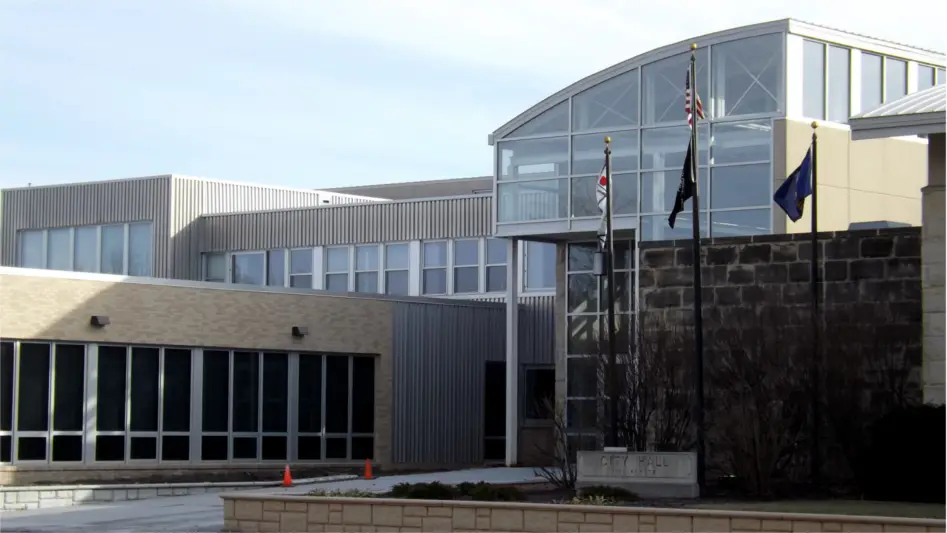Manhattan Tuesday rejected a request to rezone a 15,000 square foot property in the southeast of town to permit light industrial land use.
The request to rezone the land to I-3 zoning was made by the owner of the property, Devon Ojeda of BigKat Development, LLC. Located at 922 Riley Lane — just south of Howie’s Recycling Center and the railroad tracks — the property contains a vacant single-family home that’s fallen into disrepair and is located in a residential zoning district that is slated to remain so in the city’s comprehensive land use plan.
“Although there is that impact to the property from the adjacent railroad track and the non-residential use to the north, that does not warrant the reasoning to rezone the site and bring that heavy non-residential use into this established neighborhood,” says Assistant Community Development Director Chad Bunger. “The site would have to gain access from a narrow roadway and there are still viable residential uses for the site.”
Ojeda says the property has had issues with illegal dumping and squatting due to proximity to the railroad and that multiple attempts to sell have fallen through. Due to perceived safety concerns and how close the land is to the railroad, he chose to steer away from residential use and notes that the properties surrounding his have been used for non-residential uses.
“You have a church, a full-time church, in the residence to the east,” says Ojeda. “The lot [on the end of the lane]is I-3 zoning and the lot in between that and 922 Riley Lane is a residential lot that was basically being used in conjunction with [Custom Lawn & Landscape] just as a parking lot.”
Ojeda did not unveil plans for any specific industrial uses that may occur on the property, though said it would be likely they would build a new structure on the west side of the lot and leave east side for parking — serving as a buffer for church to the east.
That lack of detail and statute contributed to Ojeda’s request being recommended for rejection by city staff and the Manhattan Urban Area Planning Board. By statute, the MUAPB take 13 factors into account when considering rezoning requests including the property’s current use, the use of neighboring lots, the suitability of the property to maintain its current use, its conformance to the comprehensive land use plan and the overall character of the neighborhood. The MUAPB was unanimous in opposing the request, which she says is hard to ignore.
“I think our community has to develop in an orderly way,” says Commissioner Linda Morse. “And making this I-3 is not conducive to residential.”
Commissioner Aaron Estabrook says he wants entrepreneurs to feel as though they can innovate and take risks, but that this proposal didn’t feel like the right place.
“There’s just too many things going against it,” says Estabrook. “But I appreciate your attempt, and I wish you luck and hope that property becomes more usable for you in the future.
Commissioner Mark Hatesohl was the sole vote in favor of the request. He says he is nervous about being brought a rezoning request without a specific plan for what will occur on the property, but didn’t think Ojeda’s rough plans seemed onerous.
“I like the idea of not regulating people out of their livelihood and such too much,” says Hatesohl. “I’d rather you [had]come in and said something specific […] and then I would really plug for you — but I’ll vote for it simply because I don’t think that’s going to harm the initial neighborhood if you stick up a building and a parking lot.”
Mayor Pro Tempore Wynn Butler also espoused a libertarian approach to the topic similar to Hatesohl, but didn’t think the infrastructure was in place for this proposal and that more exploration needs to be done in the area.
“I would think it would have to be more of a package deal and grab everything from the church over to make it work,” says Butler. “And I’d like to see that perhaps happen.”
Bunger said if there was interest in industrial uses in the area, administration would prefer to examine redevelopment or rezoning of the area as a whole rather than spot rezoning in an established neighborhood.
Mayor Usha Reddi rounded out the vote rejecting the rezoning request, though didn’t want to close the door on making the lot productive again.
“I hope our city staff and you and other area business owners can come up with something there,” says Reddi. “That is a residential area, but at the same time we don’t want it to just not be anything.”


